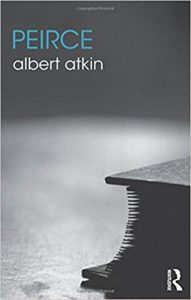
Verifying a statement with action, or evaluating the pragmatic significance of a statement or concept, leads to the consideration of the context of evaluation and its particularities. Who is evaluating the statement? What are the overarching goals and values? What counts as a consequence? When we desire to be “pragmatic”, we should also be mindful of the restrictions we impose in our evaluation. Peirce’s approach to pragmatism is useful in this regard, particularly as he attempted to dissociate it from individualism, nominalism, and psychologism.
… concentrating on the pragmatic maxim from the point of view of individuals might render pragmatically meaningless concepts which over longer term have clearer practical bearings.
Atkin (2016, p. 56)
Peirce’s pragmatism, introduced in Atkin’s book (Chapter 2), is contrasted both with verificationism of the logical positivists and with William James’s version of pragmatism. For positivists, theoretical statements and abstract concepts are a shorthand, and are otherwise empty of meaning. This position is known as nominalism. Peirce was not a nominalist. What he recognized as real included generalities, ambiguities, and possibilities. Another way of describing the contrast is in terms of what the two positions regard as effect, i.e., that which could verify, or that which is the basis of a pragmatic evaluation of, a statement. For positivists, an effect has to be sensory. A sensory effect should, of course, be obtainable by anyone, not just by trained observers or those who find themselves within a particular type of context or history.
The contrast with James is more tricky. James saw pragmatism as a type of (or as a replacement for) foundations in philosophy (treating it as a meta-philosophical position), more so than Peirce who saw it as a guiding principle. In his later treatment of pragmatism, he argued against individualism–expressed in the quote above–and psychologism, trying to differentiate his position from that of James.
I am particularly interested in pragmatism as a method for inquiry, which involves tracing out (both in actual and imagined experience) the effects of concepts and propositions.
The method prescribed in the maxim is to trace out in the imagination conceivable practical consequences–that is, the consequences for deliberate, self-controlled conduct–of the affirmation or denial of the concept (CP8.191 (1904))
Atkin (2016, p.66)
Reference:
Atkin, A. (2016). Peirce. Routledge.
1 thought on “Peirce: Pragmatic Maxim”
Comments are closed.